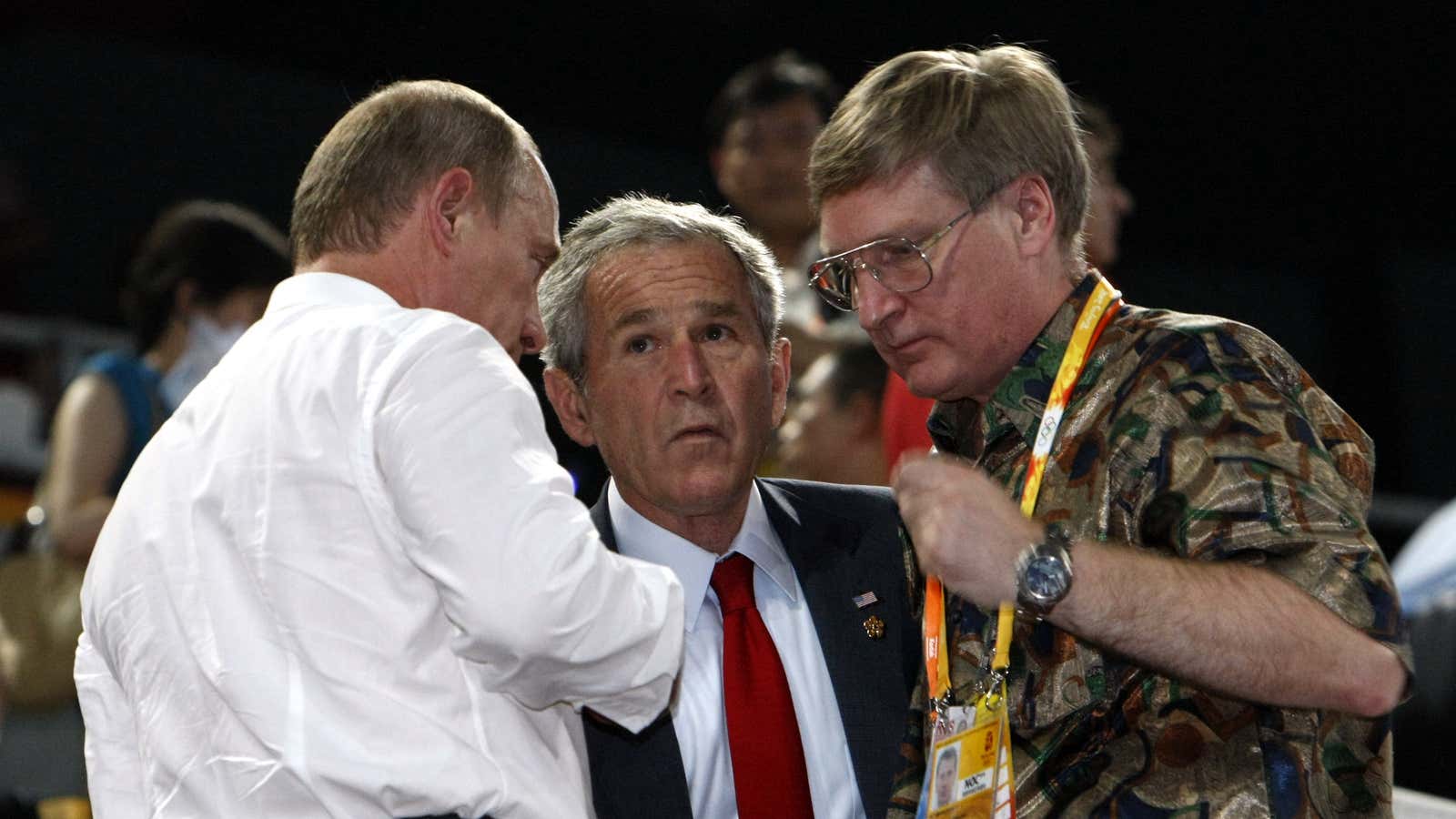The eyes of the world are on Pyeongchang, where today’s opening ceremonies mark the official beginning of the 2018 Winter Olympic Games. In other words, it’s a great time to invade somewhere else.
The distraction of the Olympic Games has been an ingredient in Russian leader Vladimir Putin’s aggressive foreign policy in recent years. In 2008, Russia launched a military intervention into disputed regions of Georgia in eastern Europe. The conflict unfolded at the same time as the opening ceremonies at the summer Olympic games in Beijing—with Putin, then prime minister and Russia’s leader in all but name, in attendance alongside US president George W. Bush, who did not look pleased.
Six years later, Putin had an opportunity to repeat the trick, during the 2014 Winter Olympics hosted by Russia. At the time, the pro-Russian government of Ukraine was collapsing, with protestors demonstrating against Ukraine’s withdrawal from ties with the European Union. The night before the games’ closing ceremony, Putin took part in a lengthy meeting with his security team to plan an intervention in Ukraine.
“We ended at about seven in the morning,” the strongman told Russian state TV a year later. “When we were parting, I said to my colleagues: we must start working on returning Crimea to Russia.” In the days following the Olympics, Russian soldiers without insignia on their uniforms began entering Ukraine. Within a month the strategic Black Sea peninsula had been annexed into Russia.
Both incidents also hinged on local events, which may make their timing during the Olympics coincidental; indeed, action in Ukraine may have been intended to distract from the wave of corruption stories related to the Sochi Olympics. During the 2010 and 2012 Olympic games, no major violations of international law took place—which may reflect Putin’s cosmetic break from the presidency between those years. By the time of the 2016 games, Russia had become enmeshed in its bloody intervention in Syria’s civil war.
This year, a decade of aggressive interventions, low oil prices and international sanctions have blunted Russia international ambitions. “I don’t see where Russia are looking to get involved,” Jeffrey Mankoff, a Russian foreign policy expert at the Center for Strategic and International Studies, told Quartz, noting that the stretched regime is looking to tamp down on its involvement in Syria.
Another foreign policy standoff has already taken center stage at this year’s Olympic games: North Korea’s burgeoning nuclear missile program. A last minute diplomatic push by South Korea has resulted in some joint participation in the games by the two countries, which is hoped to prevent the isolated state from disrupting the event. In 1988, the North launched a terror campaign to try and disrupt that year’s Olympic games in Seoul.
Of course, Russia plays a role in these tensions, too, as a reluctant participant in international sanctions designed to prevent nuclear proliferation, and as a not-so-secret underminer of the same punishments. While experts say Russia doesn’t see a war on the Korea peninsula as in its interest, Russian officials also are reluctant to see US influence in Asia increase after any deal to limit North Korea’s weapons technology.
Should the Russian military get antsy during the current games–say, if Putin needs a distraction from the doping scandal that banned many Russian athletes from this year’s games—don’t count on the economic punishment doled out by Bush and president Barack Obama following the previous Olympic incursions. Donald Trump, who says he has a “good relationship” with the former KGB agent, has so far refused to implement a new round of trade restrictions, even though secretary of state Rex Tillerson has warned of renewed Russian efforts to tamper with American elections.
